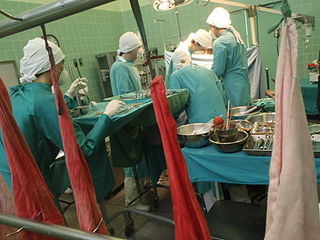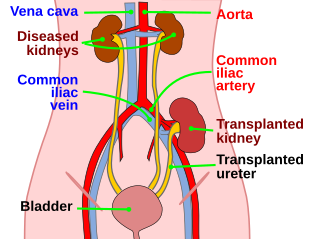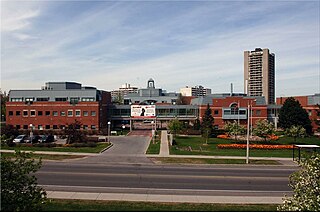
Organ donation is the process when a person allows an organ of their own to be removed and transplanted to another person, legally, either by consent while the donor is alive or dead with the assent of the next of kin.

Organ transplantation is a medical procedure in which an organ is removed from one body and placed in the body of a recipient, to replace a damaged or missing organ. The donor and recipient may be at the same location, or organs may be transported from a donor site to another location. Organs and/or tissues that are transplanted within the same person's body are called autografts. Transplants that are recently performed between two subjects of the same species are called allografts. Allografts can either be from a living or cadaveric source.

A donation is a gift for charity, humanitarian aid, or to benefit a cause. A donation may take various forms, including money, alms, services, or goods such as clothing, toys, food, or vehicles. A donation may satisfy medical needs such as blood or organs for transplant.

Kidney transplant or renal transplant is the organ transplant of a kidney into a patient with end-stage kidney disease (ESRD). Kidney transplant is typically classified as deceased-donor or living-donor transplantation depending on the source of the donor organ. Living-donor kidney transplants are further characterized as genetically related (living-related) or non-related (living-unrelated) transplants, depending on whether a biological relationship exists between the donor and recipient.

Canadian Blood Services is a non-profit charitable organization that is independent from the Canadian government. The Canadian Blood Services was established as Canada's blood authority in all provinces and territories except for Quebec in 1998. The federal, provincial and territorial governments created the Canadian Blood Services through a memorandum of understanding. Canadian Blood Services is funded mainly through the provincial and territorial governments.

The United Network for Organ Sharing (UNOS) is a non-profit, scientific and educational organization that administers the only Organ Procurement and Transplantation Network (OPTN) in the United States, established by the U.S. Congress in 1984 by Gene A. Pierce, founder of United Network for Organ Sharing. Located in Richmond, Virginia, the organization's headquarters are situated near the intersection of Interstate 95 and Interstate 64 in the Virginia BioTechnology Research Park.
LokiTorrent was a BitTorrent indexing service operated by Edward Webber ("Lowkee") from 2004 until 2005. The domain name was originally registered on 24 February 2004.
Organ procurement is a surgical procedure that removes organs or tissues for reuse, typically for organ transplantation.

The National Organ Transplant Act (NOTA) of 1984 is an Act of the United States Congress which established the framework for the U.S. organ transplant system. The act clarified the property rights of human organs from deceased individuals and created a public-private partnership known as the Organ Procurement and Transplantation Network (OPTN), which was empowered to manage organ allocation on a national basis.
Organ trade is the trading of human organs, tissues, or other body products, usually for transplantation. According to the World Health Organization (WHO), organ trade is a commercial transplantation where there is a profit, or transplantations that occur outside of national medical systems. There is a global need or demand for healthy body parts for transplantation, which exceeds the numbers available.

Kochouseph Thomas Chittilappilly is an Indian business magnate, writer, investor and philanthropist.
Organ transplantation in Israel has historically been low compared to other Western countries due to a common belief that organ donation is prohibited under Jewish law. This changed with the passage of new organ donation laws in 2008. If two patients have the same medical need, priority will now go to the patient who has signed an organ donor card, or whose family members have donated an organ. This policy was nicknamed don't give, don't get. The law also defines "brain death" as an indication of death for all legal purposes, including organ donation. Additionally the law provides financial reimbursement to living donors for medical expenses due to donation and lost time at work. Organ trafficking is explicitly banned. Health insurance plans can no longer reimburse patients who go abroad to receive transplants.
Jo-Anne Elizabeth Dobson is a former Ulster Unionist Party (UUP) politician who was a Member of the Northern Ireland Assembly (MlA) for Upper Bann from 2011 to 2017. She took up the role as Northern Ireland Ambassador for charity Kidney Care UK in February 2018, and has promoted organ donation.
Organ donation in the United States prison population is the donation of biological tissues or organs from incarcerated individuals to living recipients in need of a transplantation.

MOHAN Foundation is a not-for-profit, registered non-government charity organisation in India that works in the field of deceased organ donation and transplantation. MOHAN is an acronym for Multi Organ Harvesting Aid Network. It has offices in Chennai, Hyderabad, Bengaluru, Delhi, Mumbai, Chandigarh, Nagpur, Jaipur and information centers at Kerala and Imphal.

The HIV Organ Policy Equity Act is a law that modifies rules regarding organ donation between HIV-positive individuals. The law authorizes clinical research and the revision of rules about organ donation and transportation as a result of the research. Organs from HIV donors would only be going to individuals who are already HIV positive, but could lead to 600 additional organ transplants a year. The use of HIV-positive organs was previously a federal crime. This bill passed the United States Senate during the 113th United States Congress, and also passed the United States House of Representatives. It was signed into law as PL 113-51 by President Barack Obama on November 21, 2013.
Organ donation is when a person gives their organs after they die to someone in need of new organs. Transplantation is the process of transplanting the organs donated into another person. This process extends the life expectancy of a person suffering from organ failure. The number of patients requiring organ transplants outweighs the number of donor organs available.
Southwest Transplant Alliance (STA) is a United States non-profit organ procurement organization (OPO) headquartered in Dallas, Texas and founded in 1974. It is one of 58 federally-designated OPOs in the US, and one of three that service Texas.
Organ transplantation in the Indian state of Tamil Nadu is regulated by India's Transplantation of Human Organs Act, 1994 and is facilitated by the Transplant Authority of Tamil Nadu (TRANSTAN) of the Government of Tamil Nadu and several NGOs. Tamil Nadu ranks first in India in deceased organ donation rate at 1.8 per million population, which is seven times higher than the national average.
Organ donation in India is regulated by the Transplantation of Human Organs and Tissues Act, 1994. The law allows both deceased and living donors to donate their organs. It also identifies brain death as a form of death. The National Organ and Tissue Transplant Organisation (NOTTO) functions as the apex body for activities of relating to procurement, allotment and distribution of organs in the country.








